- Clone
- 22F6 (See other available formats)
- Regulatory Status
- RUO
- Other Names
- IKZF2, IKAROS family zinc finger 2, ANF1A2, ZNF1A2, ZNFN1A2
- Isotype
- Armenian Hamster IgG
- Ave. Rating
- Submit a Review
- Product Citations
- publications

-

Human peripheral blood lymphocytes surface stained with CD4 PE/Cyanine7, and then were intracellularly stained with Helios-APC (clone 22F6). -

C57BL/6 mouse splenocytes surface stained with CD4 PE/Cyanine7, and then were intracellularly stained with Helios-APC (clone 22F6).
| Cat # | Size | Price | Quantity Check Availability | Save | ||
|---|---|---|---|---|---|---|
| 137221 | 25 tests | 167€ | ||||
| 137222 | 100 tests | 328€ | ||||
Helios is a member of the Ikaros family of zinc finger transcription factors. It contains a C-terminal region composed of 2 zinc-finger domains that mediate dimerization between the family members. Helios was originally cloned from a mouse thymoma line. It is mainly expressed in peripheral T cells and thymocytes. It is found at high levels in a subpopulation of regulatory T cells. Helios plays an important role in T cell development and homeostasis. Overexpression of Helios profoundly alters αβ T cell differentiation and activation. It has been determined that silencing of Helios in B cells is critical for maintaining normal B cell function. Helios is also involved in tumor immunity.
Product DetailsProduct Details
- Verified Reactivity
- Mouse, Human
- Antibody Type
- Monoclonal
- Host Species
- Armenian Hamster
- Immunogen
- Helios peptide (aa 51-107)
- Formulation
- Phosphate-buffered solution, pH 7.2, containing 0.09% sodium azide and BSA (origin USA)
- Preparation
- The antibody was purified by affinity chromatography, and conjugated with APC under optimal conditions.
- Concentration
- Lot-specific (to obtain lot-specific concentration and expiration, please enter the lot number in our Certificate of Analysis online tool.)
- Storage & Handling
- The antibody solution should be stored undiluted between 2°C and 8°C, and protected from prolonged exposure to light. Do not freeze.
- Application
-
ICFC - Quality tested
- Recommended Usage
-
Each lot of this antibody is quality control tested by intracellular flow cytometry using our True-Nuclear™ Transcription Factor Staining Protocol.
For flow cytometric staining, the suggested use of this reagent is 5 µl per million cells in 100 µl staining volume or 5 µl per 100 µl of whole blood.It is recommended that the reagent be titrated for optimal performance for each application. - Excitation Laser
-
Red Laser (633 nm)
- Application Notes
-
NOTE: For flow cytometric staining with this clone, True-Nuclear™ Transcription Factor Buffer Set (Cat. No. 424401) offers improved staining and is highly recommended over the Foxp3 Fix/Perm Buffer Set (Cat. No. 421403) and the True-Nuclear™ 10X Perm Buffer (Cat. No. 424403).
View more applications data for a different format of this clone in our Scientific Poster Library. - Application References
-
- Thornton AM, et al. 2010. J. Immunol. 184:1. PubMed
- Verhagen J and Wraith D. 2010. J. Immunol. 185:7129.
- Stone B, et al. 2012. Clin Immunol. 145:153. PubMed
- Vaeth M, et al. 2012. PNAS. 109:16258. PubMed
- Angin M, et al. 2014. PLoS One. 9:86920. PubMed
- Bedke T, et al. 2014. Immunol Cell Biol. PubMed
- Liu Y, et al. 2014. Am J Physiol Gastrointest Liver Physiol. 307:177. PubMed
- Verhagen J and Wraith DC. 2014. J. Immunol. Methods. S0022. (FC) PubMed
- Product Citations
-
- RRID
-
AB_10662535 (BioLegend Cat. No. 137221)
AB_10662900 (BioLegend Cat. No. 137222)
Antigen Details
- Structure
- A zinc finger nuclear transcription factor of the Ikaros family, containing 2 zinc-finger domains in C-terminal region.
- Distribution
-
Regulatory T cells (Tregs), conventional T cells, thymocytes.
- Function
- Plays an important role in T cell development and homeostasis, involved in tumor immunity.
- Cell Type
- T cells, Thymocytes, Tregs
- Biology Area
- Cell Biology, Immunology, Transcription Factors
- Molecular Family
- Nuclear Markers
- Antigen References
-
1. Kelly CM, et al. 1998. Curr. Biol. 8:508.
2. Dovat S, et al. 2005. J. Immunol. 175:3508.
3. Cortes M, et al. 1999. Curr. Opin. Immunol. 11:167.
4. Cai Q, et al. 2009. J. Immunol. 183:2303.
5. Zhang Z, et al. 2007. Blood 109:2190.
6. Hahm K, et al. 1998. Genes Dev. 12:782. - Gene ID
- 22779 View all products for this Gene ID 22807 View all products for this Gene ID
- UniProt
- View information about Helios on UniProt.org
Related FAQs
Other Formats
View All Helios Reagents Request Custom Conjugation| Description | Clone | Applications |
|---|---|---|
| FITC anti-mouse/human Helios | 22F6 | ICFC |
| PE anti-mouse/human Helios | 22F6 | ICFC |
| Alexa Fluor® 647 anti-mouse/human Helios | 22F6 | ICFC |
| Pacific Blue™ anti-mouse/human Helios | 22F6 | ICFC |
| Alexa Fluor® 488 anti-mouse/human Helios | 22F6 | ICFC |
| APC anti-mouse/human Helios | 22F6 | ICFC |
| Purified anti-mouse/human Helios | 22F6 | ICFC,IP |
| PerCP/Cyanine5.5 anti-mouse/human Helios | 22F6 | ICFC |
| PE/Dazzle™ 594 anti-mouse/human Helios | 22F6 | ICFC |
| PE/Cyanine7 anti-mouse/human Helios | 22F6 | ICFC |
| Alexa Fluor® 700 anti-mouse/human Helios | 22F6 | ICFC |
| Spark PLUS UV395™ anti-mouse/human Helios | 22F6 | ICFC |
Customers Also Purchased
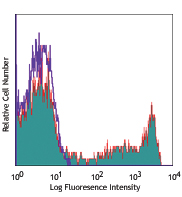
Compare Data Across All Formats
This data display is provided for general comparisons between formats.
Your actual data may vary due to variations in samples, target cells, instruments and their settings, staining conditions, and other factors.
If you need assistance with selecting the best format contact our expert technical support team.
-
FITC anti-mouse/human Helios
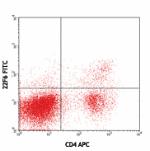
C57BL/6 splenocytes surface stained with CD4-APC (GK1.5), an... 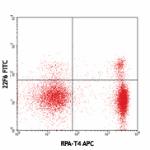
Human peripheral blood lymphocytes surface stained with CD4-... -
PE anti-mouse/human Helios
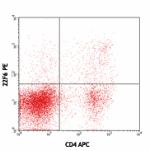
C57BL/6 splenocytes surface stained with CD4-APC (GK1.5), an... 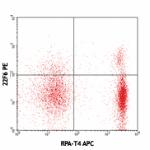
Human peripheral blood lymphocytes surface stained with CD4-... -
Alexa Fluor® 647 anti-mouse/human Helios
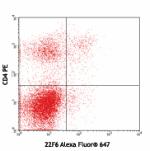
C57BL/6 splenocytes surface stained with CD4-PE (GK1.5), an... 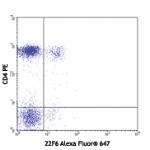
Human peripheral blood lymphocytes surface stained with CD4-... -
Pacific Blue™ anti-mouse/human Helios
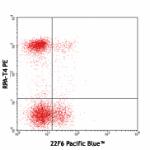
Human peripheral blood lymphocytes surface stained with CD4-... 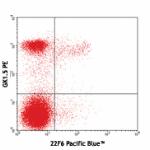
C57BL/6 splenocytes surface stained with CD4-PE (GK1.5), and... -
Alexa Fluor® 488 anti-mouse/human Helios
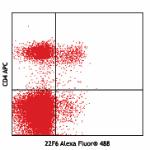
C57BL/6 splenocytes surface stained with CD4-APC (GK1.5) an... 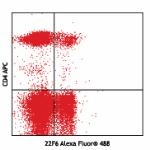
Human peripheral blood lymphocytes surface stained with CD4-... -
APC anti-mouse/human Helios

Human peripheral blood lymphocytes surface stained with CD4 ... 
C57BL/6 mouse splenocytes surface stained with CD4 PE/Cyanin... -
Purified anti-mouse/human Helios

C57BL/6 splenocytes surface stained with CD4-APC (GK1.5), an... 
Human peripheral blood lymphocytes surface stained with CD4-... 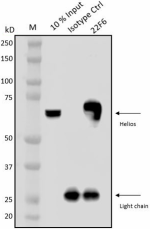
Whole cell extracts (190 µg total protein) prepared from Jur... -
PerCP/Cyanine5.5 anti-mouse/human Helios
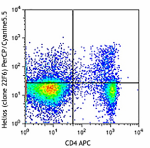
C57BL/6 splenocytes were stained with CD4 APC, and then stai... 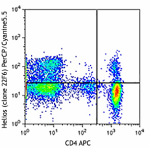
Human peripheral blood lymphocytes were stained with CD4 APC... -
PE/Dazzle™ 594 anti-mouse/human Helios
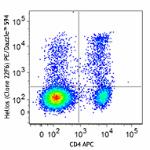
C57BL/6 splenocytes were surface stained with CD4 APC and th... 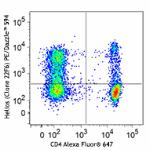
Human peripheral blood lymphocytes were surface stained with... -
PE/Cyanine7 anti-mouse/human Helios

C57BL/6 splenocytes (left) or human peripheral blood lymphoc... -
Alexa Fluor® 700 anti-mouse/human Helios

C57BL/6 splenocytes (left) or human peripheral blood lymphoc... -
Spark PLUS UV395™ anti-mouse/human Helios

C57BL/6 splenocytes were surface stained with anti-mouse CD4... 
Human peripheral blood lymphocytes were surface stained with...
 Login / Register
Login / Register 









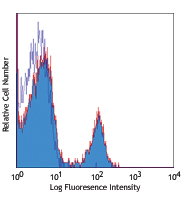
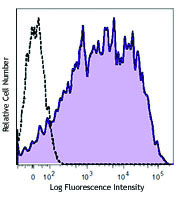
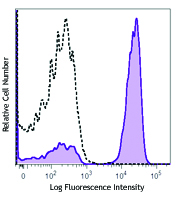



Follow Us